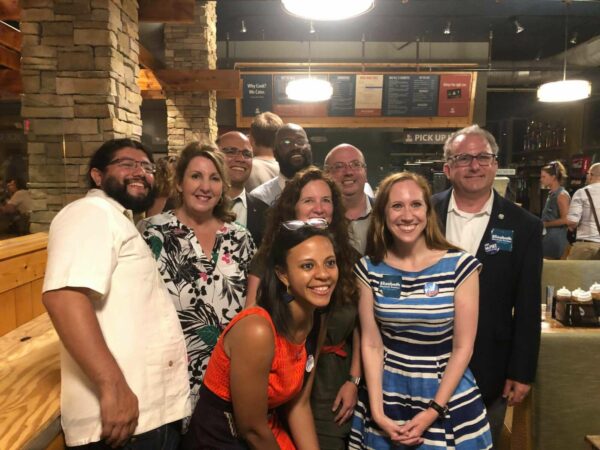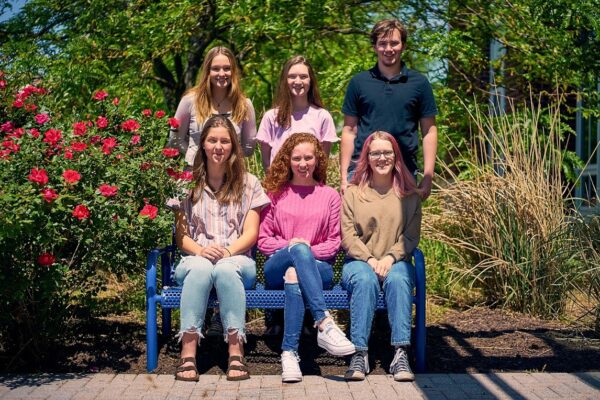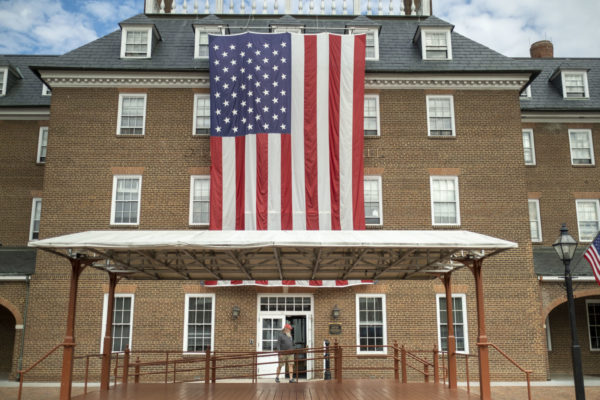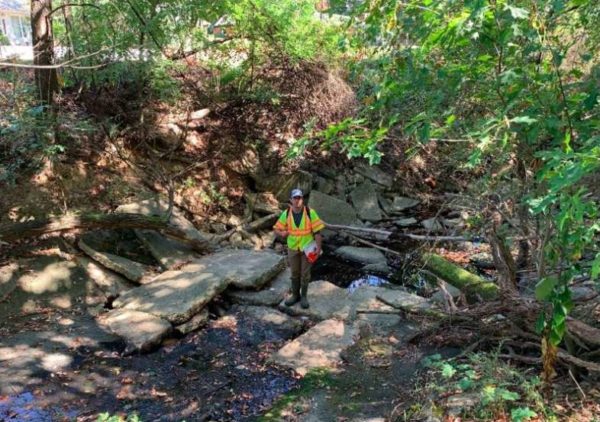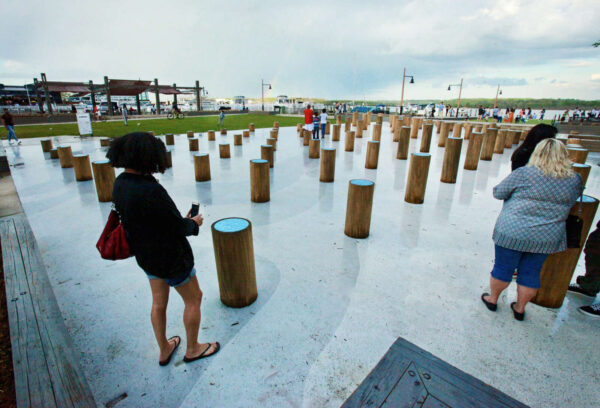Last night was a rout for a vocal contingent of Alexandrians pushing for a change in city leadership, but both top dogs in the local Democratic party and their opposition say the fight isn’t over.
At Los Tios Grill in Del Ray, former Alexandria Mayor Allison Silberberg told enthusiastic supporters that conversations over issues like the Seminary Road Diet and Taylor Run Stream restoration project would continue, although the candidates who put those issues at the forefronts of their campaigns lost.
Silberberg said that her supporters should join boards and commissions and join their civic associations, continue speaking out and working on changing the city from within.
“This is a democracy,” Silberberg said. “All voices need to be heard. I remain dedicated to those causes and getting things done, and I encourage people to stay involved.”
On the Bring Integrity Back to Alexandria Facebook group, a page that had been a social gathering place for locals frustrated with city leadership, the reaction was dour, with members calling the results “depressing” or blaming the outcome on outside influences in local politics.
In terms of voting precincts, Silberberg won City Hall and a handful of the more residential areas in the center of the city, like around Seminary Hill, but Wilson won the more densely urban West End, Old Town, and Del Ray.
The election saw 23% of registered voters show up to the polls — a relatively high voter turnout rate for a non-Presidential election year.
Clarence Tong, chair of the Alexandria Democratic Committee, said the high number of candidates — 13 candidates in the Democratic primary for six seats — was likely one of the reasons for the high turnout, and that last night’s results were an endorsement for the leadership of Wilson and the incumbent City Council.
“Yesterday we experienced high primary turnout in Alexandria. this was a reflection of the high quality of the democratic statewide and local candidates on the ballot, likely the largest number in our history,” Tong said. “The great thing about the Democratic Party is the broad range of experiences and perspective from our candidates.”
Tong said that many of the issues debated during the campaign will likely continue to be debated after the election.
“I would fully expect the policy issues that were debated during the Council primary to continue in other public forums,” he said.
Photo via Alexandria Democratic Committee/Facebook
Last year, T.C. Williams High School senior Nikki Harris broke an exclusive, significant story. Superintendent Gregory Hutchings, Jr. was sending one of his children to an in-person private school at a time when ACPS was heavily in the midst of hybrid learning.
It was a shining example of the kind of independent, investigative journalism at Theogony, the high school’s student newspaper.
Harris and a team of five other student journalists will be taking the lead at the news organization next school year — a transitional period both for the newspaper and the school it covers.
The school’s name will change from T.C. Williams High School to Alexandria City High School. While the name change has been getting headlines, Theogony editors — like their peers at the renamed Washington-Liberty High School in Arlington — say the issue has been a bigger deal for adults than the student body.
“At least among people I talk to, very few people interested,” Harris said. “More were [interested] in June 2020, but [now] it’s kind of a distraction from structural issues.”
Ethan Gotsch, an incoming editor of Theogony whose column Titan Underground profiled local musicians, said the name change is just one of the big changes coming to the school.
“We’re also going to have our first Friday night lights and we’re going back to in-person instruction,” he said.
Editors at Theogony said the bigger issues within the student body — more than the name of the school — is the ongoing struggle to close the achievement gaps and the push for punishment reform within the school.
“[Outgoing editor] Bridgette [Adu-Wadier] wrote a lot about the suspension to prison pipeline, especially for students of color, and about whether teachers reflect student body,” Harris said.
Harris said while there was a relatively proportionate number of Black teachers to Black students, that was not at all the case for Latino or Hispanic students, who comprise around 40% of the student body.
Harris said the torch will be passed to the new class of editors to follow up on that and other issues of school equity.
Jacqueline Lutz, another incoming editor for Theogony, said that T.C. students are also frequently tuned in to city-wide issues.
“A lot of times what I’ve found is the issues that T.C. students face are basically local issues as well,” Lutz said. “We always try to find our T.C. angle, but also the local angle as well.”
Last November, Theogony wrote about the Taylor Run controversy, which has since become one of the talking points in the 2021 Mayoral and City Council elections. Gotsch said the local primary is another issue that’s been talked about within the school.
“As students, there is probably a limited amount of things we can do to tackle these issues,” Gotsch said, “but we do write about the Democratic primary.”
Beyond the changes coming to the school, there are also changes incoming for Theogony. The student news organization’s main readership has traditionally been its print edition, distributed through the school, but with the school shut down Theogony had to transition this past year to a more online-focused model. Now, the student news group is looking at how that balance carries over into the 2021-2022 school year.
“We’ve been thinking a lot about how we transitioned entirely to online,” said Harris. “Previously, print was our main source of readership. Now, we’re thinking a lot about how to balance that out or whether we should keep online as our main thing.” Read More
With no more mayoral debates, now it all boils down to the Democratic primary on June 8.
Like the main event at a boxing match, Mayor Justin Wilson and former Mayor Allison Silberberg on Thursday night maneuvered through a series of questions in the final of four Seminary Ridge Civic Association candidate forums.
This is the final debate or forum for the two candidates until the June 8 Democratic primary.
Wilson is leading in fundraising and endorsements, while underdog Silberberg has gotten support from groups like the Bring Integrity Back to Alexandria Facebook page for agreeing on a number of its pet issues, including government transparency, reversing the Seminary Road Diet, and curbing developments.
Fifteen City Council candidates participated in the Seminary Ridge conversations, opining on density, affordable housing, government transparency, flooding, and, their opinions on making changes to the controversial Seminary Road Diet.
After a 4-3 Council vote in 2019, the road, which is next to Inova Alexandria Hospital, was reduced from four to two lanes in exchange for a center turn lane, bike lanes and sidewalks on both sides of the street, crosswalks and medians. A majority of Council candidates are now in favor of taking a look at bringing travel lanes back from two to four lanes on the 0.9 mile stretch of roadway between N. Quaker Lane and Howard Street.
Wilson said that he is in favor of tweaking the plan, although has been accused of ignoring the opposition of 13 civic associations.
“It’s unfortunately we couldn’t get everyone in the community on the same page on this issue,” Wilson said. “I believe the improvements that we made were good ones. I’m hopeful that in the future we can continue to tweak as necessary.”
Silberberg said she would restore the four lanes.
“This is a major arterial road that leads to our only hospital,” she said. “I’ve seen it and many residents have seen it and told me about it that they’ve seen ambulances stuck. I think we have a chance to right this wrong, and, of course, keep the pedestrian improvements, but I wouldn’t have voted for it and I will restore the travel lanes if I can get everyone together on that.”
Transparency
Silberberg said she’s been saddened to hear reports of residents not trusting their government, and defended recently pledging herself to an accountability pledge labeled the Alexandria Constituents’ Bill of Rights. Silberberg lost to Wilson in the Democratic primary in 2018, and says that she worked 16 hours a day, seven days a week during her single term.
“I think they [City staff] should sign the pledge as well,” she said.
Silberberg also criticized the performance and six-figure salary of City Manager Mark Jinks.
“It is a lot of money, frankly. I brought this up (when mayor) but nobody agreed with me, but for the City Manager to have a car allowance. It sounds minor, but I don’t think we should have that for him. I think we should revise that.”
Wilson said that Jinks’ salary was in the middle of the pack when compared to the salaries of neighboring jurisdictions, and that he is appropriately paid given the organization that he runs.
Colocation of affordable housing
Wilson said he does not want to colocate affordable housing on the grounds of Alexandria City Public Schools, a position echoed by Silberberg on another controversial issue.
“I don’t support putting affordable housing on our existing school properties,” he said. “We need more instructional space.”
Silberberg said that the school system is bursting at the seams as it is.
“I would certainly support an ordinance to say no to putting housing on our limited school properties,” she said.
Stream restoration
Wilson said that the city’s Environmental Policy Commission is full of “good science minds” that can look into the city’s stream restoration projects, including at Taylor Run, Strawberry Run and Lucky Run. Last month, Council opted to send aspects of the projects back to the drawing board in light of widespread public criticism.
Silberberg says that Alexandria has few forests left, and that she has long been opposed to the plans, as well as Wilson’s “unending pursuit of overbuilding”.
Transit lanes on Duke Street
Speaking of road diets, Wilson and Silberberg agreed that the Duke Street Transitway project should not result in fewer traffic lanes between Landmark Mall and the King Street-Old Town Metro station.
“I personally don’t think the volumes on Duke street would allow us to remove any traffic lanes on Duke Street,” Wilson said. “We’re gonna have a lot of community engagement to figure out the best alignment, as well as looking at the intersections to try to reduce some of the cut-through traffic that we see in a lot of our neighborhoods.”
The city is embarking on the public engagement part of the project next month.
On $60 million in federal COVID funding
Silberberg said that the nearly $60 million in COVID relief funds coming to the city should be handled carefully, and after all of last year’s flooding that the funds should be spent on stormwater infrastructure.
“This is a once-in-a-lifetime investment from the federal government, and we need to be extremely careful and good stewards of this money,” she said. “Think about what is mission critical. First and foremost, I think we clearly have to focus like a laser beam on this flooding, the sewage and stormwater flooding that’s attacking, and stalking, really, our residents every time it rains.”
Wilson said he’s proud to have led the city through the most significant public health crisis in a century, and that the city needs to invest more in the social, emotional and academic losses experienced by Alexandria children.
“We have an opportunity to make generational investments in our community around our infrastructure, around our facilities, around some of the systems around workforce development and things that are going to ultimately benefit our community for generations,” he said. “We got 1,300 suggestions from the community, and we’re going to be working in June and July to apply those suggestions in figuring out how to use that first tranche of money.”
Image via Seminary Ridge Civic Association/Zoom
Stark differences were on full display Saturday night, as Alexandria Mayor Justin Wilson and former Mayor Allison Silberberg sparred in a contentious debate on local issues.
Wilson defended his record since taking the mayorship from Silberberg in 2018. Silberberg, however, said she wants to restore the public trust, and that the city is at an inflection point.
“We’ve seen in the last couple of years certain decisions and policies that have been decided that really put our city at risk in many ways,” Silberberg said. “Our visions for the city are different. And our city is at an inflection point… It saddens me to hear so many residents express a profound loss of confidence and trust in our local government. As your mayor, I would certainly be very focused on transparency, and rebuilding the public trust.”
The hour-long debate was hosted by the Alexandria Democratic Committee, and moderated by Robert McCartney, a senior regional correspondent for The Washington Post. Wilson currently leads in fundraising and endorsements, and the debate comes on the heels of Wilsons’ endorsement by Virginia Governor Ralph Northam.
Silberberg presented herself as an environmentalist in favor of “smart growth,” while Wilson said that the city needs to match growth with transportation infrastructure.
“I’m inspired to turn what I’ve learned about our city’s resilience over the last year into a mission for our city’s future,” Wilson said. “I know that by investing in our kids, investing in our basic infrastructure, and making sure that we have an economy that can support the services that our residents expect and demand, Alexandria cannot only survive in the aftermath of this pandemic, but we can thrive.”
Silberberg’s tenure as mayor was plagued by lone 6-1 votes, and Wilson said that she voted against a number of important issues, including a controversial 5.7 cent tax hike in 2017 that resulted in significant capital improvement funding.
“I speak out for the people and I listen to our residents,” Silberberg said. “I’m certainly in favor of transit oriented development, that has been what we’ve all supported across the many years. But what I’m really for is smart growth. And what that means really, is that you don’t have unabashed out of scale overbuilding on every square inch, that you do keep some open space, which helps with the flooding.”
Silberberg criticized Wilson’s handling of COVID-19, and said that the city’s face mask ordinance needed to be passed sooner that the fall of 2020.
“It’s been a harrowing year for all of us,” she said. “I know a number of folks who have had COVID, and I’ve lost some friends. I don’t think we should have waited till October 1 with the outdoor mask order. Cities all across the country were helping restaurants, but the restaurants in the Bradley Center in the middle of the city and on the West End weren’t helped as much as other places, so we need to look at that across the board.”
Wilson said that the mask ordinance was the first adopted in Virginia, and was replicated by Northam in his statewide executive order. He also said that the city’s vaccination rate for Latinos is higher than for white residents, a result of “aggressive outreach” to the city’s nonprofits.
“I’m very proud of that ordinance,” he said. “Alexandria led the way in providing new small business flexibility using outdoor spaces, sidewalks, closing streets, parking lots and everything to help keep our businesses afloat. I worked with the mayor of Richmond to go down to the General Assembly and ultimately get the governor to include an executive order that allowed carry-out cocktails, which has helped keep our restaurants a floating all around our city. We spent millions of dollars a small business assistance again leading the way in the region, and helping our small businesses providing grants to small businesses all around our city.”
Silberberg also said that she would reverse the Seminary Road Diet, which she said is a transparency issue.
Near the end of a nearly eight-hour meeting, the City Council opted last night to send aspects of the city’s controversial stream restoration projects back to the drawing board in light of widespread public criticism.
Stream restoration became something of a surprise Seminary Road-like issue last year. Many recurring public complaints — namely over a lack of communication from staff and concerns regarding city studies — resurfaced during the Taylor Run and Strawberry Run stream restoration debates.
But in other ways, the coalition uniting against the city’s plans for Taylor Run and Strawberry Run looked different from the Seminary Road debate. While the same elements that composed to Seminary Road diet opposition were present in the stream restoration debates — local civic associations and the Bring Integrity Back to Alexandria! group — they were joined by more unexpected sources of dissent, like Audubon Society of Northern Virginia and the Alexandria Environmental Policy Commission (EPC).
“This has evolved into a political issue, but I’m here to voice my opinion on the science,” said EPC member Marta Schantz. “We’re concerned that many questions about current approach and good faith exploration of alternatives remains unanswered.”
At the City Council meeting, the EPC laid out several concerns that had been repeated by some environmentalists throughout the process — with staff reiterating many earlier responses.
It’s a muddy, tangled issue with branching concerns over the efficiency of natural channel design, the impact on wildlife in the area and the impacts of erosion — but one of the fundamental issues considered by City Council at the meeting was whether or not the stream is as polluted as the city’s modeling indicates.
Critics of the project, including the city’s Natural Resource Manager Rod Simmons, say the city is calculating pollution levels in the stream not based on first hand evidence gathering, but rather on state-approved models based on studies done in Pennsylvania. A study by Simmons found significantly lower levels of phosphates in Taylor Run, though Simmons’ study was criticized by the city as not providing a complete view of total phosphate levels in the water.
Complicating matters is the city’s plans to have the stream restoration work count towards the city’s required pollution reduction credits. Staff reiterated that alternatives to stream restoration could be more expensive, less beneficial to the city — like paying credits for an equivalent amount of pollution reduction — and result in fees passed on to tax payers.
Even then, staff said the city will likely eventually need to take some form of action to prevent homes new Strawberry Run and Taylor Run from being threatened by erosion.
“If we take approach that we don’t need to do anything, we risk losing grants, we pay for credits, and we’ll eventually need to do something to protect neighboring homes from erosion,” said Matt Landes, project director for the Department of Project Implementation.
City staff said there’s a looming deadline to meet pollution reduction guidelines laid out by the Virginia Department of Environmental Quality. Staff said that to meet a June 2022 deadline, the stream restoration projects need to move into final design in the May/June timeframe and the project needs to move into procurement by December this year.
Testing Taylor Run’s water for phosphates, staff said, could take two-to-three months to get reliable results. But the city council — led by urging from members Amy Jackson and John Chapman — agreed to take that time to do the studies and get a better picture of the pollutant levels in Taylor Run and Strawberry Run.
“It’s disconcerting to a lot of community members tonight,” said Jackson. “We usually don’t have public comment except for public hearings. They’ve been here pretty much every time signing in to discuss what they think is important… to be continually, what I feel: shoved aside.”
The Environmental Council of Alexandria, which is led by former Vice Mayor Andrew Macdonald, has been the city’s main opponent to the project.
“Staff reports and responses from City staff indicate that they want to proceed with this destructive and ineffective project despite all the scientific evidence against doing so,” ECA wrote on Facebook on April 23. “This may be our last chance to stop this environmentally unsound project.”
Chapman said the city should also take those months to get a better look at alternatives to current stream restoration plans.
“We need to take a good look at alternatives,” Chapman said, “and not just the ones presented here.”
While Strawberry Run and Taylor Run took the lion’s share of the conversation, Mayor Justin Wilson said it would be willful ignorance on the city’s part to go forward with testing those without getting a more accurate idea about pollutant levels in Lucky Run, also slated for restoration work.
“I have a hard time justifying how Lucky Run is okay but Taylor Run and Strawberry Run aren’t,” Wilson said. “[We’re] not sampling Lucky Run… because we don’t want to know what the answer is.”
In response, the Council agreed to also loop Lucky Run in with planned testing of the other stream sites. The City Council directed staff to come back at a later date to lay out more community engagement and a timeline for further study of the streams.
Photo via City of Alexandria
After touring the area and meeting with residents, Alexandria City Councilman John Taylor Chapman will ask his colleagues tonight to stop the Taylor Run Stream Restoration Project.
The move is a decisive blow against the project, which city staff defend as the most cost effective alternative to keep up with its Chesapeake Bay Watershed credit requirements. Last month, Chapman and Vice Mayor Elizabeth Bennett-Parker requested a legislative meeting to discuss the Taylor Run and Strawberry Run stream restoration projects, which critics say disrupt natural habitats.
“I look forward to asking questions of staff tonight, but I intend to ask my colleagues to support stopping this (Taylor Run) project, and in turn, directing both staff and our Environmental Policy Commission to work together to bring back to council an update on the capture of environmental credits, with potential credits that we can receive and updated cost estimates and a strategy on future capture of credits,” Chapman said.
Staff plans to clear the Taylor Run waterway near T.C. Williams High School and Chinquapin Park will result in the removal of 269 trees, of which they say 22% are dead.
Mayor Justin Wilson said he’s happy to consider alternative approaches to meeting the city’s clean water obligations and addressing the environmental damage and future risk to Taylor Run.
“Ultimately, whatever we decide must be based in the science, in compliance with the law and affordable,” Wilson said.
Opposition has been led by the Environmental Council of Alexandria, which also says that the city’s soil tests at Taylor Run are not accurate. City Councilwoman Amy Jackson has also moved against the Taylor Run project after the EPC advised Council to step back.
Chapman will also ask Council to support an annual report from the Environmental Policy Commission and staff on the city’s environmental credit progress. He said that such an update would allow for the city to find additional projects.
“(I)t will give the community and City Council a firm understanding of our current status, real opportunities, and the cost, without the stream restoration projects that our advisory policy commission and our community are against,” Chapman said.
Photo via City of Alexandria
Former Mayor Allison Silberberg very publicly didn’t plan on running against Mayor Justin Wilson in the Democratic primary, but as weeks slipped by and no other challenger came forward — and Council Member Mo Seifeldein dropped out — Silberberg said she felt she needed to step up.
Three years after Silberberg lost her reelection bid to Wilson, she’s back to reclaim the position.
“I couldn’t just stand by and watch our city put at risk by destructive policies of our current mayor,” Silberberg said.
Wilson has racked up several endorsements from current and former members of city leadership, including other City Council members and state legislators, but Silberberg said she isn’t particularly worried by that. Silberberg said in the last week, her campaign has raised over $64,000, while Wilson recently announced that he raised $90,000.
“I’m not concerned,” Silberberg said. “In many cases, that’s the old guard. I’m honored to have support form people across our city. We’re at a crossroads in our city. I’m a person who gets things done and I listen to people.”
Silberberg’s list of objections to Wilson is, beyond a “greatest hits” of concerns that have emerged from local advocacy groups like Bring Integrity Back to Alexandria, an extension of many of the same battles Silberberg fought with Wilson on when the two were locked in opposition during her tenure as mayor.
Silberberg said some of the biggest issues fueling her campaign are:
- Reverting Seminary Road Changes — “Wilson took away vital travel lanes on Seminary Road,” Silberberg said. “I would restore them. It’s a major arterial road to our only hospital. It was one of the safest streets in the city, the data showed that, but in a distorted kind of way he said this is a vote about public safety. Thirteen civic associations banded together and said do not do this, it affects every resident in the city.”
- Opposition to City Stream Restoration Projects — “I’m fighting to save Taylor Run… saving the forest there, and Strawberry Run,” she said. “I would listen to environmentalists, scientists and experts who have come forward on their own to say that this is a disaster in the making, to destroy the forest. This is some of the last remaining forests in our city, you can’t just replant and wait 30 years, because it’s not just the trees but the environment around it.”
- School-Affordable Housing Colocation — “I’m committed to protecting limited school properties from housing,” Silberberg said.
- Opposition to Eisenhower Slaughterhouse — “He pushed through the slaughterhouse where the existing businesses a football throw away banded together and banded the Mayor not to do that,” Silberberg said. “There are no other slaughterhouses within the beltway, and not one in our city. The impact on environmental waste is really upsetting — not to mention the smell. It was dismissive of the fact that the business owner has had numerous code violations in other states. I would not have supported that.”
Some of the reversals could be a challenge. City staff recently laid out the costs to alternatives to the Taylor Run Stream Restoration the city could be required to pursue to keep up with its Chesapeake Bay Watershed credit requirements.
Silberberg is dubious of staff’s claims.
“Staff, with all due respect, seems to be inflating or misrepresenting the costs for alternatives,” she said. “We need to have all that vetted openly and discussed.”
Silberberg said she was also surprised and frustrated that staff hadn’t tested the soil at Taylor Run before committing the city to funding the overhaul.
“Nobody on the city staff, and they admitted this, that they hadn’t tested the soils at Taylor Run,” Silberberg said. “Someone on their own volition hired a highly regarded laboratory, tested the soils, and it came back with negligible amounts of phosphorous, that’s one of the driving forces. So basically the city admitted that they were basing their analysis and conclusions on a generic version of soil samples in a whole other region. That’s not how we want to do analysis when it comes to a treasured spot in the city.”
Taylor Run, along with some of the other issues, go back to what Silberberg sees as a recurring problem with transparency and ethics in city leadership. Silberberg and Wilson have clashed over issues about ethics for nearly a decade, including a protracted battle over a proposed ethics pledge in 2016.
“We must restore integrity and transparency and adopt meaningful ethics reform,” Silberberg said. “That is certainly a top ethics reform, and we need a leader with demonstrated record of truth, transparency and ethics, and I am that leader. I led with an ethics initiative, and the person who led the effort to water that down was then Vice-Mayor Wilson. We did accomplish some goals, but didn’t go nearly as far as what I wanted.”
Silberberg argued that information that came to light from public Freedom of Information Act requests, and later printed by the Alexandria Times, not only showed that there were behind-the-scenes discussions on issues like Seminary Road and the Potomac Yard southern entrance that the public should know about, but also that there was too much information in those that was redacted.
“Some of the lines that weren’t redacted, which wasn’t very much, showed that he distorted the truth or lied and misled the public,” Silberberg said. Read More
Mayor gets vaccinated — “On Christmas Eve our Health Dept vaccinated 251 healthcare workers. Since that time, 51K+ Alexandrians have received at least a dose. Today, my name was called. I’m excited to receive the J&J vaccine. Thanks to our staff and volunteers!” [Twitter]
Council considers changes to taxi regulations — “Since the arrival of taxi network companies, TNCs, like Uber and Lyft in 2015, the taxi industry has been struggling to adapt to a rapidly changing market. The COVID-19 pandemic did not help the situation for an already challenged industry, and the city’s proposed code amendment aims to provide support for local taxi companies by easing specific regulations.” [Alex Times]
Wilson, Silberberg differ on stream restoration plans — “Wilson advocates moving forward with natural channel restoration; Silberberg wants to go back to the drawing board.” [Alexandria Living]
Alexandria Sportsman’s Club hosting famed sportswriter — “Len Shapiro, the Pulitzer Prize-nominated sportswriter, editor and columnist for more than 40 years for the Washington Post, will be the featured speaker for the April 21st meeting of the Alexandria Sportsman’s Club.” [Gazette]
Today’s weather — “Partly cloudy skies during the morning hours will give way to cloudy skies and rain in the afternoon. High 66F. Winds N at 5 to 10 mph. Chance of rain 60%… Showers in the evening, then cloudy overnight. Low 48F. Winds NE at 5 to 10 mph. Chance of rain 60%.” [Weather.com]
New job: Sushi helper — “The Handover is hiring sushi assistants willing to work hard and be open to learning new skills. We are a small restaurant looking for candidates with the ability to accurately prep, cut vegetables, prepare maki rolls and follow chef’s direction. Both full- and part-time positions are available. Competitive hourly pay commensurate with experience level.” [Indeed]
It was a historic week in Alexandria. Here are some of the highlights.
President Joe Biden visited the Neighborhood Health COVID-19 vaccine site at Virginia Theological Seminary on Tuesday, just before announcing that the date for adults to get access to the vaccine has been moved to April 19.
The Alexandria School Board, on Thursday night, voted to change the name of T.C. Williams High School to Alexandria City High School.
The School Board also voted unanimously to reduce the distancing requirement in ACPS schools from six feet to three feet, all the while community support is growing to expand in-person instruction to more than the current two days a week. Summer school is currently planned to begin in July and will be four days a week, and ACPS is planning on reopening to five days a week at the beginning of the next school year.
Our top story was on the T.C. Williams Titans junior varsity football team walking off the field after an incident with the Robinson Rams on Monday night. Robinson Rams players allegedly spit at and made a racial slur against T.C. players. The incident has prompted Fairfax County Public Schools to announce a “stand-down” meeting for all athletic teams and coaches to discuss “appropriate behaviors required to play sports in FCPS.”
Additionally, six Alexandria Police officers were placed on administrative duties after a chase suspect died while in custody. Police responded to a call for shots fired in the 800 block of North Patrick Street, and multiple buildings and vehicles were struck. The driver of the vehicle crashed on Interstate 295, and then jumped over an overpass barrier and fell more than 20 feet and was tased by police, arrested and later died.
Important Stories
- Alexandria aims to adjust vaccination efforts as city moves into next phase
- Alexandria Police employees give department mixed reviews
- Planning Commission approves controversial subdivision, plants potential loophole for future denial
- City says Taylor Run alternatives could cost far more than current estimates
- Crime increase prompts ARHA to install security cameras in Old Town
- City looks to Landmark Towers deal to save Arlandria
- ‘Beltway Bank Bandit’ sentenced 21 years for robbing Alexandria banks and area businesses
- Man arrested for threatening to burn down City Hall
- Wilson wins Alexandria Democratic Committee straw poll, Gaskins takes top spot over incumbents
Top Stories
- JUST IN: T.C. Williams JV football team walks off field after alleged racial slur, spitting incident
- BREAKING: Shots fired in Old Town leads to chase that ends in D.C.
- JUST IN: President Biden set to visit Alexandria vaccination site Tuesday
- National Park Service announces George Washington Parkway to go on a diet
- Neighborhood Health vaccinating thousands at sites in Alexandria, Arlington and Fairfax County
- JUST IN: Woman arrested after fight on King Street Metro station platform
- UPDATE: $8,500 reported stolen in terrifying West End robbery
- JUST IN: President Biden visits COVID-19 vaccine site at Virginia Theological Seminary
- COVID-19 update: Alexandria moves into vaccination phase 1C
- JUST IN: Six Alexandria Police officers put on administrative duties after chase suspect dies
- Fairfax County man arrested for three burglaries, released three days later
Have a safe weekend!
City staff have launched a defense of the embattled Taylor Run Stream Restoration Project — criticized by some environmental activists and the city’s Natural Resources Manager Rod Simmons
As part of the budget query process, Vice-Mayor Elizabeth Bennett-Parker asked staff to look into other options as alternatives to the project. Despite reluctance towards the Taylor Run restoration project starting to take hold in the City Council, staff said in a response to Bennett-Parker they believe the current course to be the most effective one.
“If an alternative is pursued, then the 10-Year Plan would need to be revised based on the funding impact of these alternatives, each of which come with very different levels of risk and costs,” staff said. “Additionally, none of the alternatives would stabilize the sanitary sewer infrastructure which will need to be undertaken regardless.”
The Taylor Run Stream Restoration Project is expected to cost $4.5 million, half of which is paid for by the state-level Stormwater Local Assistance Fund.
Local activists have said the city’s project overestimates the levels of pollution in the stream by relying on projections rather than tests of the water and the removal of foliage from the stream — many of them mature trees — though the city has said it will replant new ones.
The first alternative analyzed is implementing smaller scale green infrastructure projects, like bioretention facilities and underground filtering. But staff said these projects could cost up to $66 million, which would come entirely from city coffers and ultimately from homeowners in Alexandria.
Staff compared smaller scale BMPs that include green infrastructure (urban bioretention, bioswales, etc.) and underground BMPs (filtering devices) as alternatives as retrofits in the right-of-way and on public property. Cost-benefit estimates for these alternatives range from $88,000 to $225,000 per pound of phosphorous reduced, respectively. (Note these estimates do not include currently uncertain costs that may arise during the planning, scoping, design or implementation phases, or future maintenance and operation costs.) Using those per pound cost ranges, capital costs are estimated between $26 million and $66 million to implement between 300 and 400 new BMPs to achieve an equivalent amount of pollution credits. This would add (refer to footnote) between $41 and $89 to the annual stormwater fee for the majority of homeowners in the City. It is also important to note that due to the high cost per pound of phosphorous removal none of these BMPs would meet the eligibility requirements (of $50,000/lb. or less) to be considered for a VDEQ Stormwater Local Assistance Program grant. Therefore, the City would need to fully fund these smaller BMPs using local funds.
Another option suggested by many opponents of the Taylor Run Stream Restoration project is additional tree planting, an option suggested in contrast to some of the tree clearing that would take place as part of the project. Staff noted in their analysis of the option that, like additional green infrastructure projects, the solution could be more expensive than the current project.
Staff compared tree planting per DEQ and EPA’s Recommendations of the Expert Panel to Define BMP Effectiveness for Urban Tree Canopy approach to generate pollution reduction credits. To achieve an equivalent pollution reduction, the City would need to plant between 421,000 and 686,000 trees at a low-end estimated cost of $84 million to $137 million and a high-end estimated capital cost of $126 million to $206 million. This would add (refer to footnote) between $113 and $287 per year to they stormwater utility fee for the majority of homeowners in the City. Like Alternative Scenario 1 these costs do not include currently uncertain costs that may arise during the planning, scoping, design or implementation phases, or future maintenance and operation costs. The issue of where to plant this volume of trees also would need to be addressed.
The last option, and possibly the alternative scenario most suggested by opponents of the Taylor Run project, is to do nothing: leave the stream alone. City staff reviewed the no-build option but said that cancelling the project without pursuing any of the other alternatives it could put its state stormwater permits (MS4) at risk.
If the City chooses to defer or cancel the Taylor Run Stream Restoration project, it brings into question the use of stream restorations as a key strategy in the City’s toolkit to meet its Bay mandates. The City’s three, currently approved stream restoration projects will cost the City approximately $3.7 million, with another $3.7 million coming in VDEQ grants. In contrast, the total cost of a “BMPs alone” strategy to reduce an equivalent amount of phosphorous for the City would be between $79 million and $201 million, which is currently not programmed in the Ten-Year Stormwater Capital Plan. This would add between $106 and $274 per year to the stormwater utility fee for a majority of homeowners. It would require the installation of over 900 total green infrastructure and underground BMPs in rights-of-way and on public property. If Council chooses one of the above scenarios for Taylor Run, or removes stream restoration from the City’s toolkit, staff would need to provide additional refined projections on the fiscal impacts and risk, and revise the City’s Stormwater Utility 10-Year Plan.
Staff said the city is currently ahead of schedule on its Chesapeake Bay Cleanup mandates, but if the city fell behind from cancelling this project, it could be subject to fines and other punitive measures.
“These would likely include prescriptive actions and schedules of interim milestones to demonstrate positive trajectory to meet the requirements, including the identification of adequate funding and scheduling to implement alternative BMPs to achieve milestones,” staff said. “These punitive measures would likely be administered through aggressive oversight by VDEQ.”
The kicker, staff said, is that separate sanitary sewer stabilization would still require impacting Taylor Run.
“The sanitary sewer runs parallel to the trail and within the southern stream bank for most of the way until it crosses to the northern side of the stream near the acidic seepage wetland, where the sheet pile for the manhole is located,” staff said. “Separately stabilizing the sanitary infrastructure in lieu of incorporating this work into a more holistic stream restoration would require tree removal for access — presumably the pedestrian trail as well as down to the stream to access the sanitary sewer crossings exposed in the stream bed — to allow heavy equipment access to stabilize the sanitary crossings by encasing the pipe in concrete.”
Mayor Justin Wilson said in an email that on Monday, April 12, from 5-7 p.m. staff and the design consultant will host a walkthrough of the project, giving community members a chance to tour the site.
“Project staff will be present and available to answer questions and discuss restoration goals and efforts in specific areas of interest,” Wilson said. “The onsite walkthrough will begin at the entrance of the Chinquapin Park trailhead located at 3120 King Street.”
An update on the project and others included in the city’s Chesapeake Bay Pollution reduction goals is also scheduled to be presented to the City Council on Tuesday, April 27, at 7 p.m.
Image via City of Alexandria


